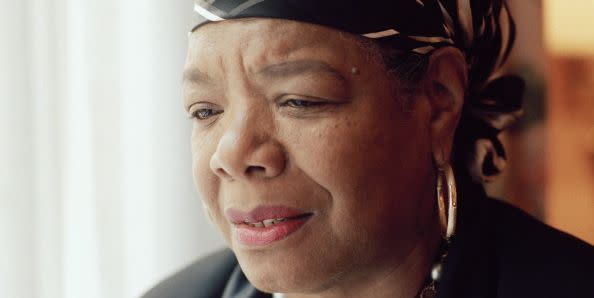Maya Angelou’s “Still I Rise” Poem Speaks to the Experience of Black Women

"Hearst Magazines and Yahoo may earn commission or revenue on some items through the links below."
Maya Angelou’s iconic poem “Still I Rise” has had an impact on the world that will echo throughout generations, especially for Black women. Everything about this poem—the repetition, the natural imagery, its ancestral pride–induces a feeling of soaring whenever read or recited. Published in Angelou’s third poetry collection, And Still I Rise, in 1978, it’s a poem about overcoming injustice and prejudice, and the immutable strength of the human spirit.
The late Nelson Mandela even chose this poem for his inauguration in 1994, after spending 27 years in Robben Island prison for his resistance to the South African apartheid government. Mandela himself spoke and wrote at length about the importance of maintaining dignity and strength in the face of overwhelming oppression.
Angelou, who grew up in the Jim Crow South and was heavily involved in the civil rights movement, experienced extreme racism and sexism as a Black woman, and that dual experience is reflected in this poem. “Still I Rise” has a special meaning for Black women, with sensual imagery and joyful celebration of Black women’s bodies, which have always been weaponized and exploited. There’s something powerful about Angelou, a survivor of child abuse, reclaiming the power and beauty and sensuality on her terms. It’s no wonder this poem has spoken and continues to speak to Black survivors of sexual violence.
“Still I Rise”
You may write me down in history
With your bitter, twisted lies,
You may trod me in the very dirt
But still, like dust, I’ll rise.
Does my sassiness upset you?
Why are you beset with gloom?
’Cause I walk like I’ve got oil wells
Pumping in my living room.
Just like moons and like suns,
With the certainty of tides,
Just like hopes springing high,
Still I’ll rise.
Did you want to see me broken?
Bowed head and lowered eyes?
Shoulders falling down like teardrops,
Weakened by my soulful cries?
Does my haughtiness offend you?
Don’t you take it awful hard
’Cause I laugh like I’ve got gold mines
Diggin’ in my own backyard.
You may shoot me with your words,
You may cut me with your eyes,
You may kill me with your hatefulness,
But still, like air, I’ll rise.
Does my sexiness upset you?
Does it come as a surprise
That I dance like I’ve got diamonds
At the meeting of my thighs?
Out of the huts of history’s shame
I rise
Up from a past that’s rooted in pain
I rise
I’m a black ocean, leaping and wide,
Welling and swelling I bear in the tide.
Leaving behind nights of terror and fear
I rise
Into a daybreak that’s wondrously clear
I rise
Bringing the gifts that my ancestors gave,
I am the dream and the hope of the slave.
I rise
I rise
I rise.
Moons and suns, tides and black oceans. The dream and the hope of the slave. Angelou’s rise from oppression creates a cinematic feel of her rising with the tide of that black ocean that carried her ancestors. The natural imagery in this poem, as well as the reference to ancestor pride, makes it transcendent, almost spiritual. Much of Angelou’s work has this hymn-like quality, a nod to the influences of Black gospel music.
And with the juxtaposition of the violent language and actions of the oppressor—“bitter, twisted lies” and “You may shoot me with your words / You may cut me with your eyes / You may kill me with your hatefulness”—and the lyrical, gentle, joyous language of the oppressed, Angelou is making a clear statement. Hate rots, but rising above that hate and into the comforting arms of ancestors and deep self-love is how we grow seeds for ourselves and for the next generation. Defiant, formidable, and graceful, “Still I Rise” has long taken its rightful place in the Black poetry canon, and we celebrate the great mind of Maya Angelou, who gave us this gift.
You Might Also Like
